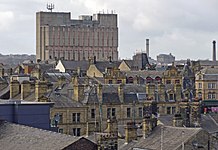High Point, Bradford
This article needs to be updated. (April 2024) |
| High Point | |
|---|---|
Bradford, West Yorkshire | |
| Country | England |
| Coordinates | 53°47′44″N 01°45′31″W / 53.79556°N 1.75861°W |
| Completed | 1972 |
| Client | Yorkshire Building Society |
| Design and construction | |
| Architecture firm | John Brunton Partnership |
High Point is a high rise former commercial building in Bradford, in West Yorkshire, England. It is a prominent example of Brutalist architecture. Designed by John Brunton Partnership of Bradford, it was completed in 1972 to serve as the headquarters of the Yorkshire Building Society but went unused for decades.
History
High Point was built as the headquarters of the
The
Design
High Point is a prominent example of Brutalist architecture.[2] It was designed by the John Brunton Partnership of Bradford.[4] It is 8 storeys in height and is noted for its use of ribbed concrete.[3] George Sheeran, writing in Bradford in 50 Buildings, describes the "long narrow windows, like arrow slits, giving the appearance of a castle keep" unconsciously implying the surety of the Yorkshire Building Society's loans and investments. The extreme height of the building in comparison to its neighbours can cause excessive wind turbulence.[1] In his A Guide to the New Ruins of Great Britain, Owen Hatherley describes High Point as "utterly freakish, the severed head of some Japanese giant robot clad in a West Yorkshire stone aggregate".[6]
The building had become unused for several decades prior to the 2010s. An informal panel discussion on High Point in March 2018 included participants from the Bradford Civic Society, the Director of the
An illegal rave attracted 500 revellers to the High Point in March 2010 before it was broken up by police.[7]
Gallery
-
High Point in November 2007
-
High Point from street level in August 2009
-
A distant view of High Point in March 2015
-
Detail of the tower of High Point
References
- ^ ISBN 978-1-4456-6849-9.
- ^ a b c d e Deas, Brad (4 December 2018). "High Point building, Bradford from the inside". Telegraph & Argus. Archived from the original on 4 January 2021. Retrieved 4 January 2020.
- ^ a b c Dunton, Jim (12 March 2018). "Bradford backs saving brutalist landmark". Building Design. Archived from the original on 12 August 2020. Retrieved 4 January 2020.
- ^ Twentieth Century Society. Archived from the originalon 4 January 2021. Retrieved 4 January 2020.
- ^ Bakare, Lanre (3 January 2020). "Destruction of brutalist architecture in north of England prompts outcry". The Guardian. Retrieved 3 January 2020.
- ^ Hirst, Christopher (23 October 2011). "A Guide to the New Ruins of Great Britain, By Owen Hatherley". The Independent. Archived from the original on 4 January 2021. Retrieved 4 January 2020.
- ^ O'Rouke, Tanya (1 March 2010). "Police swoop on Bradford building". Telegraph & Argus. Archived from the original on 4 January 2021. Retrieved 4 January 2020.




